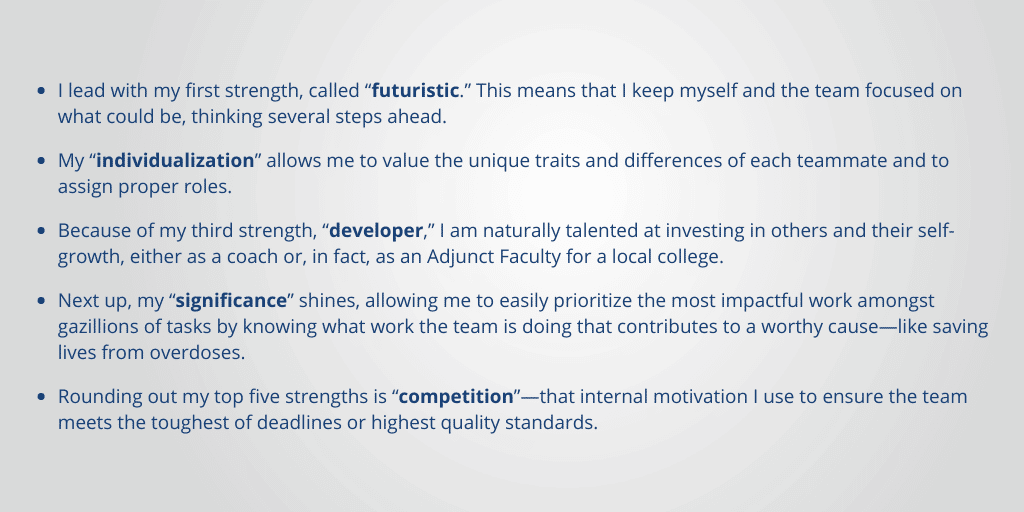Last week, the de Beaumont 40 Under 40 in Public Health gathered for a two-hour workshop on Leadership Through a Strengths Lens. Presented by Denise Keyes and Molly Harden, professional coaches at Heath Ideas, the workshop was part of a series of opportunities for honorees to network with one another, explore common challenges, and examine their public health careers during their participation in the 40 Under 40 program.
A Focus on Strengths
Denise kicked off the discussion with a discussion of Gallup’s CliftonStrengths Assessment, an approach to professional coaching and development that focuses on naming one’s natural talents and with practice, turning them into one’s strengths, in contrast with more conventional approaches that focus on identifying and fixing weaknesses.
“We are all endlessly fascinating, and strengths are one way of getting to know each other,” she explained, adding that understanding one’s strengths provides a way for people to make intentional decisions about their careers and figure out how to best show up in the context of their roles. According to the presenters, a strengths mindset improves professional engagement and overall happiness: people who focus on using their strengths are six times likelier to be engaged in their jobs and three times likelier to report an excellent quality of life than those who do not.
In other words, putting time, effort, and practice into the areas where a person is already talented can develop those areas into strengths.
Strengths Among 40 Under 40 Honorees

“As a 40 Under 40 honoree, I was excited to contribute my own insights in developing what I call “my strengths ethos” and how I navigate the workplace environment using strengths-based leadership in practice,” he said.
In breakouts, the group shared their own strengths-based insights, including the positive and negative realities of how those strengths can manifest in the workplace. They observed how being in a role that doesn’t align with one’s strengths can be “spirit-crushing,” and called out the importance of being mindful of one’s strengths in choosing what jobs to take and what role to play in their organizations.
Strengths in Leadership
“Strengths-based leaders invest in their own strengths but also the strengths of those around them,” said Denise. “They know the strengths of their team members and make sure they put together a team that complements one another’s strengths.” The self-awareness that comes from understanding one’s strengths is a key component of emotional intelligence, she explained – and together with self-management, motivation, and empathy is an important cornerstone of leadership.
“Having used this framework since 2013 to improve my self-awareness and be more productive, I now use it to coach others and foster team engagement,” said James. “Understanding my strengths helps me to explain my unique world view and natural approach to tasks, including teamwork.”
“When resolving conflict, avoiding deficits and using strengths helps individuals see everyone’s perspectives of the conflict and determine next steps,” he added. “I consciously work to avoid overusing my strengths. For example, teammates who may not enjoy competing or feeling the pressure of benchmarks require me to tailor my approach. Framing action plans by only stating the vision or big picture could also be a weakness because teammates who are more present- or past-oriented thinkers may disengage. It is important to think about how your strengths can be perceived by others and refine your approach accordingly.”






